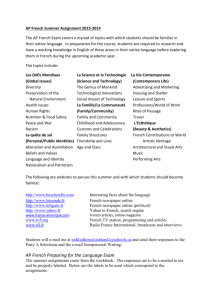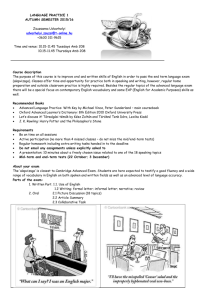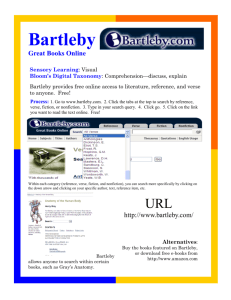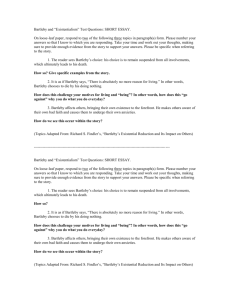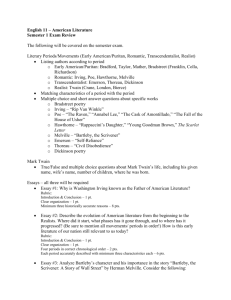Week 1 – Orientation
advertisement
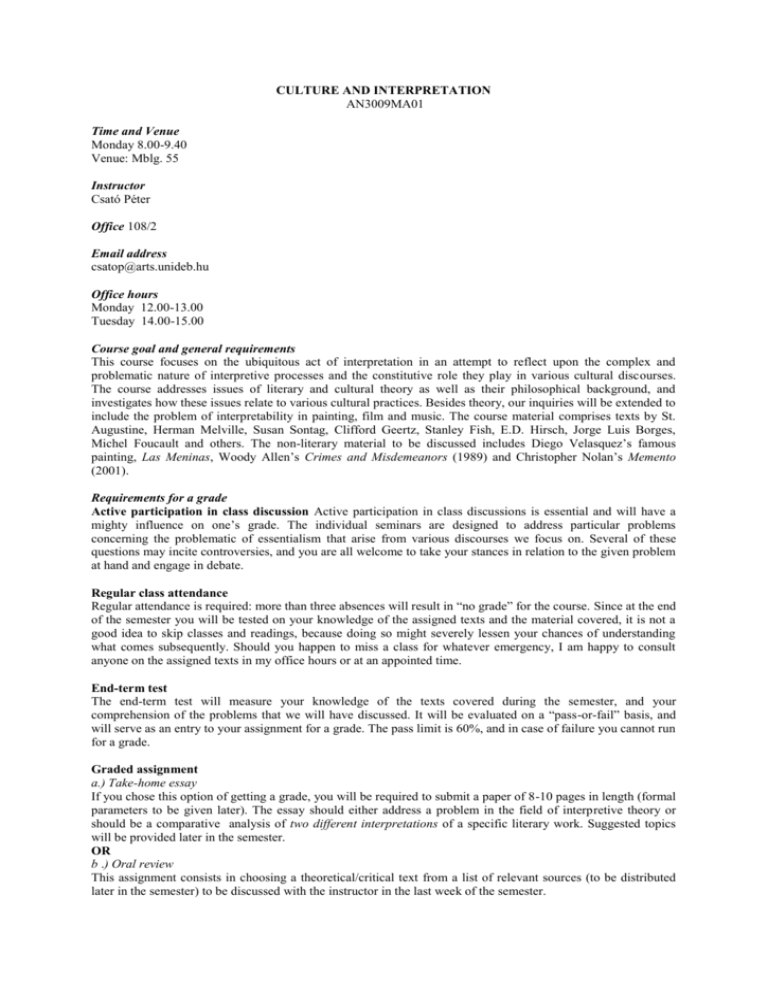
CULTURE AND INTERPRETATION AN3009MA01 Time and Venue Monday 8.00-9.40 Venue: Mblg. 55 Instructor Csató Péter Office 108/2 Email address csatop@arts.unideb.hu Office hours Monday 12.00-13.00 Tuesday 14.00-15.00 Course goal and general requirements This course focuses on the ubiquitous act of interpretation in an attempt to reflect upon the complex and problematic nature of interpretive processes and the constitutive role they play in various cultural discourses. The course addresses issues of literary and cultural theory as well as their philosophical background, and investigates how these issues relate to various cultural practices. Besides theory, our inquiries will be extended to include the problem of interpretability in painting, film and music. The course material comprises texts by St. Augustine, Herman Melville, Susan Sontag, Clifford Geertz, Stanley Fish, E.D. Hirsch, Jorge Luis Borges, Michel Foucault and others. The non-literary material to be discussed includes Diego Velasquez’s famous painting, Las Meninas, Woody Allen’s Crimes and Misdemeanors (1989) and Christopher Nolan’s Memento (2001). Requirements for a grade Active participation in class discussion Active participation in class discussions is essential and will have a mighty influence on one’s grade. The individual seminars are designed to address particular problems concerning the problematic of essentialism that arise from various discourses we focus on. Several of these questions may incite controversies, and you are all welcome to take your stances in relation to the given problem at hand and engage in debate. Regular class attendance Regular attendance is required: more than three absences will result in “no grade” for the course. Since at the end of the semester you will be tested on your knowledge of the assigned texts and the material covered, it is not a good idea to skip classes and readings, because doing so might severely lessen your chances of understanding what comes subsequently. Should you happen to miss a class for whatever emergency, I am happy to consult anyone on the assigned texts in my office hours or at an appointed time. End-term test The end-term test will measure your knowledge of the texts covered during the semester, and your comprehension of the problems that we will have discussed. It will be evaluated on a “pass-or-fail” basis, and will serve as an entry to your assignment for a grade. The pass limit is 60%, and in case of failure you cannot run for a grade. Graded assignment a.) Take-home essay If you chose this option of getting a grade, you will be required to submit a paper of 8-10 pages in length (formal parameters to be given later). The essay should either address a problem in the field of interpretive theory or should be a comparative analysis of two different interpretations of a specific literary work. Suggested topics will be provided later in the semester. OR b .) Oral review This assignment consists in choosing a theoretical/critical text from a list of relevant sources (to be distributed later in the semester) to be discussed with the instructor in the last week of the semester. SCHEDULE Week 1 – Introduction Week 2 – Culture and interpretation Clifford Geertz. “Thick Description: Toward an Interpretive Theory of Culture.” In: The Interpretation of Cultures. NY: Basic, 1973. 3-30. Week 3 -- The limits of interpretation: two approaches Umberto Eco: “Overinterpreting Texts” Richard Rorty: “The Pragmatist’s Progress” In: Interpretation and Overinterpretation, Stefan Collini ed. Cambridge: Cambridge UP, 1992. Week 4 – A case against constructivism Catherine Belsey: “What’s Real?” In: Culture and the Real. London: Routledge, 2005. 1-19. Week 5 – Consultation week – NO CLASS Week 6 – Understanding the sacred Selections from St. Augustine’s On Christian Doctrine Week 7 – Which one to believe?—Two approaches to Melville’s “Bartleby the Scrivener” Donald Fiene: “Bartleby the Christ” J. Hillis Miller: “Who is Bartleby” Week 8 – Movie session 1 Christopher Nolan: Memento (2001) Week 9 – Identity as fiction Philip Roth: The Counterlife (1986) Week 10 – How real is reality? Jorge Luis Borges: “Tlön, Uqbar, Orbis Tertius.” In: Labyrinths. NY: New Directions, 1964. Week 11 – Movie session 2 Woody Allen: Crimes and Misdemeanors (1989) Week 12 – The painting as text Michel Foucault: “Las Meninas” (Introduction to The Order of Things) Week 13 – Music (lecture) Charles Ives: The Unanswered Question John Cage. 4’33’’; Imaginary Landscape No 5; Four Solos For Voice Week 14 – End-term test Week 15 – Oral reviews

